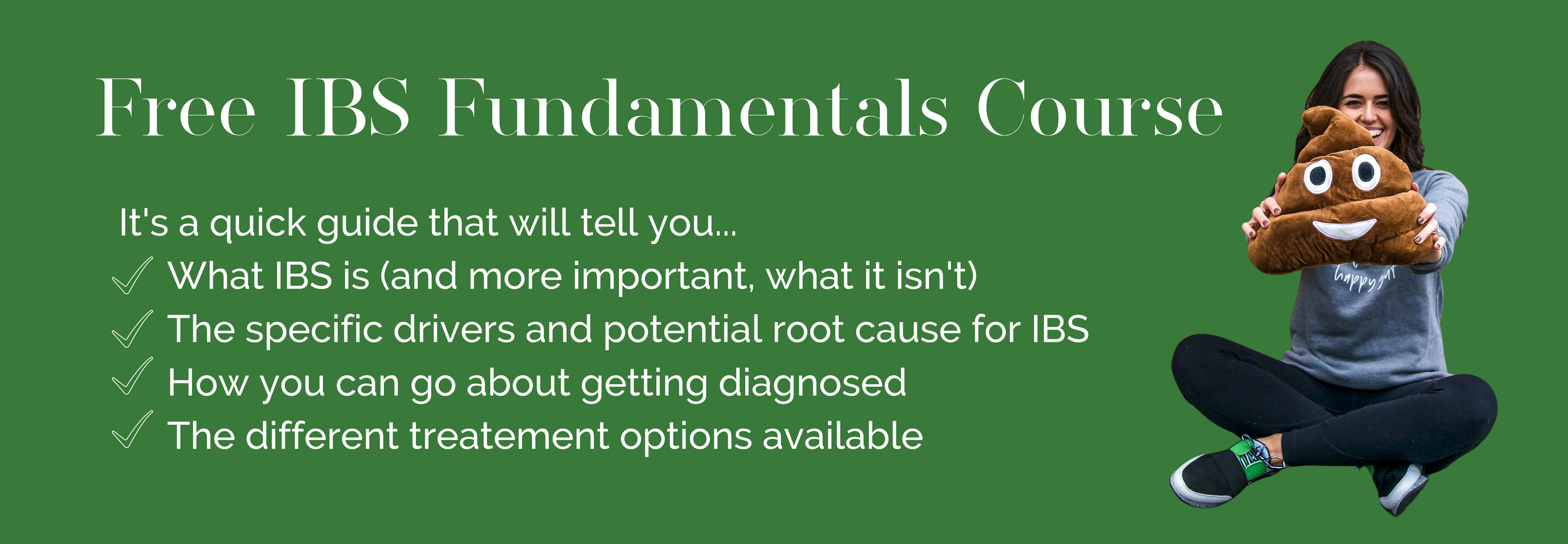How to break the self-sabotage cycle with IBS
Have you ever experienced this scenario: you have an increase in IBS or gut symptoms and then you say “well, it doesn’t matter now” and engage in the habits and behaviors that only make your symptoms worse, like eating your triggers, not sleeping, drinking more coffee or alcohol, etc?
This is what we call the self-sabotage cycle and is very common for those who live with chronic health problems, including irritable bowel syndrome (IBS).
To learn more about how to break the self sabotage cycle with IBS, watch The Gut Show episode below (captions available on the video), listen to the episode on iTunes or Spotify, or continue reading!
What is self-sabotage?
Self-sabotage means getting in the way of your own success or progress, or working against yourself. This can also look like self-harm but doesn’t always involve causing harm to yourself. It often looks like doing things that you know don’t work for your body or align with your goals, or simply taking no action towards your goals.
Examples of self-sabotage:
Staying up scrolling on your phone or binge-watching a show when you know you need to sleep
Refusing to shower and maintain hygiene when your mood is low
Skipping meals when you know your body needs nourishment
Eating past fullness due to being upset or unprocessed emotions you are feeling
Pushing your body past feelings of fatigue or pain in exercise
Self-sabotage is often rooted in a disconnect to your body and it can be detrimental to your progress in taking care of your body, as well as getting control of your IBS.
What’s your poop personality? Find out here!
How does this impact IBS management?
One way that self-sabotage can impact IBS management is by causing you to engage in behaviors that exacerbate your symptoms.
For example, people with IBS may know that certain foods trigger their symptoms, yet they may continue to eat those foods, even though they know it will make them feel worse. This then leads to that person beating themselves up, leading to even more self-sabotage like over-exercising, poor hygiene, skipping meals, purging behaviors, etc.
This type of self-sabotage can make it difficult to control IBS symptoms and can lead to a cycle of flare-ups and remission. This is often rooted in poor treatment and guidance, which leaves you feeling like if it doesn’t matter what you do, why even try?
Self-sabotage can also impact IBS management by causing you to neglect your self-care. People with IBS may know that they need to exercise, eat a healthy diet, and get enough sleep to manage their symptoms, but they may neglect these things, due to feelings of anxiety, depression, or low self-confidence. This can make it difficult to maintain a healthy lifestyle, which is crucial for managing IBS.
This is often rooted in self confidence and self-image after dealing with symptoms for a period of time. When you live with something that impacts your daily life, you feel gaslit by providers and others in your life, and you experience body dysmorphia because the way you feel in your body is different than the way you look… this can all lead to low self confidence and poor self image.
This can also be linked to being at war with your body. If you have chronic symptoms, it can be easy to think your body has betrayed you, which causes you to see your body as the enemy you are fighting against, versus a body deserving of care that you will work with.
Moreover, self-sabotage can also impact IBS management by causing you to avoid seeking professional help. People with IBS may be hesitant to see a doctor or a therapist or a dietitian, due to fear of being judged, or fear of being told that their symptoms are "all in their head." This can make it difficult to get an accurate diagnosis and appropriate treatment, which can delay symptom relief.
How can you break this cycle?
The self-sabotage cycle is the process of your thoughts that lead to actions, over and over again.
To reverse the cycle, you want to take action and challenge thoughts. This should be rooted in self-compassion because you want the actions you take to be true self care and you want to work WITH your body here. You may not think that your body is worthy or deserving yet, but you can choose to act in that way until the thoughts change.
This is something that a therapist can help you work through, and is also something our team of dietitians at Gutivate works on with our clients. We know that it can take massive action and clear guidance of that action to get unstuck, and that’s why we help with.
Are you frustrated with your IBS symptoms? Do you desire to be confident in your food choices? Do you want to have a healthier relationship with your body and diet? Are you ready to take control of your IBS?




